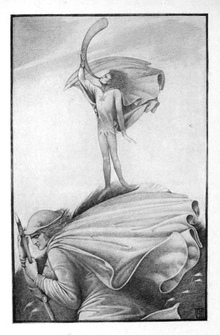The Elfin Knight
| Wikisource has original text related to this article: |

"The Elfin Knight" (Child #2; Roud #12) is a traditional Scottish folk ballad of which there are many versions, all dealing with supernatural occurrences, and the commission to perform impossible tasks.[1]
Synopsis
In the oldest extant version of this ballad (circa 1600-1650), an elf threatens to abduct a young woman to be his lover unless she can perform an impossible task; she responds with a list of tasks which he must first perform, thus evading rape. The plot is closely related to "Riddles Wisely Expounded" (Child Ballad #1), in which the Devil proposes to carry off a woman unless she can answer a number of riddles.
Later versions invert the direction of desire, with the elf proposing tasks which the lady must perform in order to be accepted as his lover. The first verse usually opens with the introduction of the title character:
The elphin knight sits on yon hill,
Blaw, blaw, blaw, wind blaw.
He blaws his horn both lewd and shril.
The wind hath blown my plaid awa.
(Note that this verse appears to be taken directly from "Lady Isabel and the Elf-Knight", Child Ballad #4; in this ballad, the horn is magic and arouses desire in the hearer.[2])
Meanwhile, a maid lies in bed, wishing she could marry the knight. Upon her speaking these words, the knight appears, telling her he will marry her if she will perform numerous tasks, all impossible.
"For thou must shape a sark[1] to me,
Without any cut or heme," quoth he.
- ^ a shirt
She promptly responds with her own list of impossible tasks, and thereby gains her supernatural husband.
'The Fairy Knight'
Buchan's Ballads of the North of Scotland, II, 296.
1 THE Elfin knight stands on yon hill,
Blaw, blaw, blaw winds, blaw
Blawing his horn loud and shrill.
And the wind has blawin my plaid awa
2 'If I had yon horn in my kist,
Blaw, blaw, blaw winds, blaw
And the bonny laddie here that I luve best!
And the wind has blawin my plaid awa
3 'Ye maun make me a fine Holland sark,
Blaw, blaw, blaw winds, blaw
Without ony stitching or needle wark.
And the wind has blawin my plaid awa
4 'And ye maun wash it in yonder well,
Blaw, blaw, blaw winds, blaw
Where the dew never wat, nor the rain ever fell.
And the wind has blawin my plaid awa
5 'Now sin ye've askd some things o me,
Blaw, blaw, blaw winds, blaw
It 's right I ask as mony o thee.
And the wind has blawin my plaid awa
6 'My father he askd me an acre o land,
Blaw, blaw, blaw winds, blaw
Between the saut sea and the strand.
And the wind has blawin my plaid awa
7 'And ye maun plow 't wi your blawing horn,
Blaw, blaw, blaw winds, blaw
And ye maun saw 't wi pepper corn.
And the wind has blawin my plaid awa
8 'When ye've dune, and finishd your wark,
Blaw, blaw, blaw winds, blaw
Ye'll come to me, luve, and get your sark.'
And the wind has blawin my plaid awa
Commentary
The countering of impossible tasks with other impossible tasks is a common motif in the folktale Aarne-Thompson type 875, the Clever Girl;[3] a fairy tale making use of this motif is The Wise Little Girl.
Variants
This ballad was one of 25 traditional works included in Ballads Weird and Wonderful (1912) and illustrated by Vernon Hill.
The song "Scarborough Fair" might be a variant recorded later,[4] first by Martin Carthy, and later and more famously by Simon & Garfunkel. A similar variant is "Whittingham Fair", a song that was popular in the north and west of Northumberland.[5] There are also several American variants, which differ greatly, among them "My Father Had an Acre of Land", "The Parsley Vine", and "The Shirt of Lace".
The song also forms the basis for both the melody and lyrics for Bob Dylan's "Girl from the North Country" first recorded on The Freewheelin' Bob Dylan in 1963.
A novel by Nancy Werlin, Impossible (Penguin/Dial, 2008), was inspired by the song.
Recordings
- Ewan MacColl performed this song with Peggy Seeger on their 1961 album, Classic Scots Ballads
- Kate Rusby performed it on her 2005 album, The Girl Who Couldn't Fly
- Joel Frederiksen includes this song as "Whittingham Faire (The Elfin Knight)" on his 2007 album, The Elfin Knight – Ballads and Dances
- Omnia performed this song, on Alive! (2007), as "The Elven Lover"
See also
References and notes
- ↑ Francis James Child, English and Scottish Popular Ballads, "The Elfin Knight" Sacred-texts.com
- ↑ Child, notes to Ballad #2, The English and Scottish Popular Ballads
- ↑ Francis James Child, The English and Scottish Popular Ballads, v 1, p 8, Dover Publications, New York 1965
- ↑ Child, Francis James (1894). The English and Scottish Popular Ballads, Part 9. 9. Boston / Cambridge: Houghton, Mifflin and Company / The Riverside Press. p. 206.
- ↑ Peter Shepheard. "Child 2: The Elfin Knight". Springthyme.co.uk. Retrieved 2015-04-16.
External links
| Wikisource has original text related to this article: |
- "Scottish Ballads Online" Child Ballad #2: 'The Elfin Knight With 13 variants from Francis J Child's collection and a further 8 from the appendix and a link to versions from the living tradition.
- "My Father Had an Acre of Lan" melody and lyrics at folkinfo.org
- "The Elfin Knight" at the Vaughan Williams Memorial Library